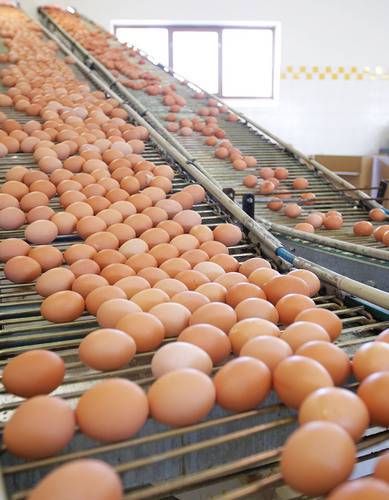Egg production is a vital component of the agriculture sector in South America, contributing significantly to food security, economic growth, and employment. As the demand for high-quality protein continues to rise, the region’s egg producers play a crucial role in meeting consumer needs while fostering innovation and sustainability. In this article, we explore the dynamics of the egg production industry in South America and highlight the largest egg producers in the region.
The South American Egg Industry: An Overview
Historical Context
Egg production in South America has a rich history, dating back to ancient civilizations such as the Incas and Mayans, who domesticated and bred birds for their eggs. Over time, egg production evolved into a modern industry, with advancements in breeding, nutrition, housing, and disease management.
Current Landscape
Today, South America boasts a vibrant and diverse egg industry, with countries like Brazil, Argentina, Colombia, and Chile leading the way in production. The region benefits from favorable climatic conditions, abundant natural resources, and a growing domestic market for poultry products.
Key Drivers
Several factors drive the growth of the egg industry in South America:
- Population Growth: The region’s expanding population, coupled with rising disposable incomes and urbanization, has led to increased demand for protein-rich foods, including eggs.
- Health and Nutrition: Eggs are recognized for their nutritional value, providing essential vitamins, minerals, and high-quality protein, making them a staple in the South American diet.
- Technological Advancements: Advances in poultry genetics, nutrition, and management practices have improved production efficiency, resulting in higher egg yields and better-quality eggs.
- Export Opportunities: South American egg producers are exploring export markets, capitalizing on their competitive advantages, such as lower production costs and high-quality products.
Challenges and Opportunities
Challenges
Despite its growth, the egg industry in South America faces several challenges:
- Disease Outbreaks: Avian diseases, such as avian influenza and Newcastle disease, pose significant threats to poultry health and production, requiring robust biosecurity measures and vaccination programs.
- Environmental Concerns: Intensive egg production systems can have environmental impacts, such as air and water pollution and waste management issues, necessitating sustainable farming practices.
- Market Volatility: Fluctuations in feed prices, currency exchange rates, and consumer preferences can affect egg producers’ profitability and competitiveness in domestic and international markets.
- Regulatory Compliance: Compliance with food safety, animal welfare, and environmental regulations adds complexity and costs to egg production operations, requiring ongoing monitoring and adherence to standards.
Opportunities
Despite these challenges, the South American egg industry presents several opportunities for growth and innovation:
- Value-Added Products: Diversification into value-added egg products, such as organic, free-range, and specialty eggs, allows producers to cater to niche markets and premium segments, commanding higher prices and margins.
- Vertical Integration: Vertical integration, involving control over the entire production chain, from breeding and hatching to feed production and egg processing, enhances efficiency, quality control, and market competitiveness.
- Technology Adoption: Embracing digital technologies, automation, and data analytics in egg production facilities improves productivity, traceability, and decision-making, driving operational excellence and cost savings.
- Sustainable Practices: Implementing sustainable farming practices, such as alternative energy sources, waste recycling, and water conservation, enhances environmental stewardship and consumer trust, positioning producers for long-term success.
Top Egg Producers in South America
1. Granja Mantiqueira
Country: Brazil
Production Capacity: 15 million eggs per day
Granja Mantiqueira is one of Brazil’s largest egg producers, with modern production facilities and a focus on quality, innovation, and sustainability.
2. Hy-Line do Brasil
Country: Brazil
Production Capacity: 13 million chicks per year
Hy-Line do Brasil is a leading supplier of layer chicks and genetics, providing high-performance breeds and technical support to egg producers across South America.
3. Cencosud Supermercados
Country: Chile
Production Capacity: 5 million eggs per day
Cencosud Supermercados is a major retailer in Chile that vertically integrates egg production, supplying fresh eggs to its stores nationwide.
4. Granja El Rosario
Country: Colombia
Production Capacity: 3 million eggs per day
Granja El Rosario is a prominent egg producer in Colombia, known for its commitment to animal welfare, biosecurity, and environmental sustainability.
5. Granja Valle Verde
Country: Argentina
Production Capacity: 2.5 million eggs per day
Granja Valle Verde is a leading egg producer in Argentina, specializing in cage-free and organic egg production, catering to premium market segments.
6. Granja Avícola Luján
Country: Argentina
Production Capacity: 2 million eggs per day
Granja Avícola Luján is a family-owned egg producer in Argentina, focusing on sustainable farming practices and product innovation.
7. Fábrica de Produtos Avícolas Mantiqueira
Country: Brazil
Production Capacity: 1.5 million eggs per day
Fábrica de Produtos Avícolas Mantiqueira is a subsidiary of Granja Mantiqueira, specializing in egg processing and value-added egg products.
8. Grupo Avícola SRL
Country: Argentina
Production Capacity: 1 million eggs per day
Grupo Avícola SRL is a leading egg producer in Argentina, with a focus on organic and free-range egg production, meeting consumer demand for sustainable and ethical products.
9. Granja El Prado
Country: Uruguay
Production Capacity: 800,000 eggs per day
Granja El Prado is a prominent egg producer in Uruguay, known for its high-quality eggs and commitment to animal welfare and environmental sustainability.
10. Ovopar
Country: Paraguay
Production Capacity: 500,000 eggs per day
Ovopar is a major egg producer in Paraguay, supplying fresh eggs to local markets and foodservice establishments, with a focus on product quality and safety.
Conclusion
The egg production industry in South America is a thriving and dynamic sector, driven by growing demand for high-quality protein, technological advancements, and a focus on sustainability. Despite facing challenges such as disease outbreaks, environmental concerns, and market volatility, egg producers in the region are well-positioned to capitalize on opportunities for growth and innovation. By embracing value-added products, technology adoption, and sustainable practices, South American egg producers can continue to play a vital role in meeting the region’s food security needs while contributing to economic development and environmental stewardship.
Related: Top 40 Egg Producing Companies


